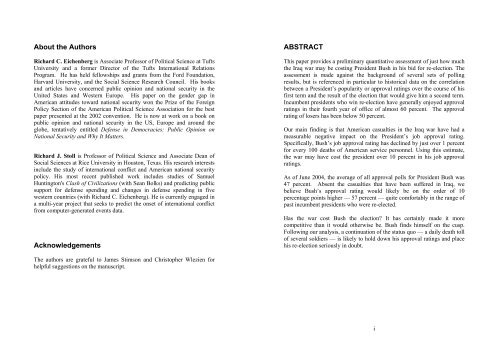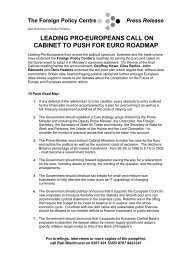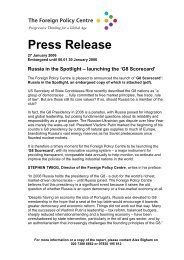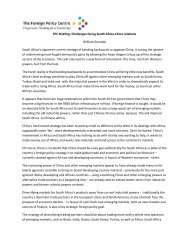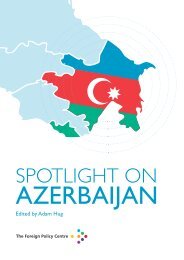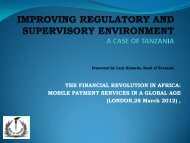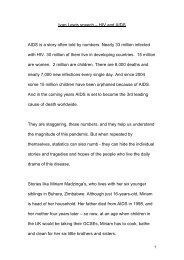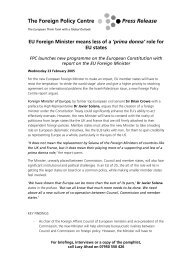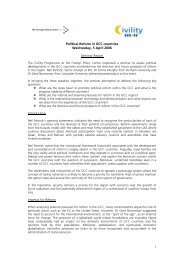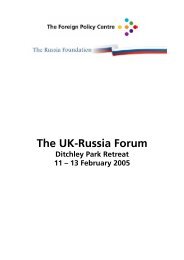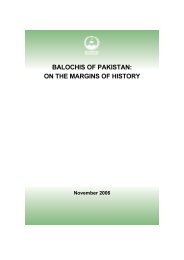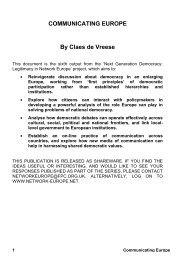The Political Fortunes of War - Foreign Policy Centre
The Political Fortunes of War - Foreign Policy Centre
The Political Fortunes of War - Foreign Policy Centre
You also want an ePaper? Increase the reach of your titles
YUMPU automatically turns print PDFs into web optimized ePapers that Google loves.
About the Authors<br />
Richard C. Eichenberg is Associate Pr<strong>of</strong>essor <strong>of</strong> <strong>Political</strong> Science at Tufts<br />
University and a former Director <strong>of</strong> the Tufts International Relations<br />
Program. He has held fellowships and grants from the Ford Foundation,<br />
Harvard University, and the Social Science Research Council. His books<br />
and articles have concerned public opinion and national security in the<br />
United States and Western Europe. His paper on the gender gap in<br />
American attitudes toward national security won the Prize <strong>of</strong> the <strong>Foreign</strong><br />
<strong>Policy</strong> Section <strong>of</strong> the American <strong>Political</strong> Science Association for the best<br />
paper presented at the 2002 convention. He is now at work on a book on<br />
public opinion and national security in the US, Europe and around the<br />
globe, tentatively entitled Defense in Democracies: Public Opinion on<br />
National Security and Why It Matters.<br />
Richard J. Stoll is Pr<strong>of</strong>essor <strong>of</strong> <strong>Political</strong> Science and Associate Dean <strong>of</strong><br />
Social Sciences at Rice University in Houston, Texas. His research interests<br />
include the study <strong>of</strong> international conflict and American national security<br />
policy. His most recent published work includes studies <strong>of</strong> Samuel<br />
Huntington's Clash <strong>of</strong> Civilizations (with Sean Bolks) and predicting public<br />
support for defense spending and changes in defense spending in five<br />
western countries (with Richard C. Eichenberg). He is currently engaged in<br />
a multi-year project that seeks to predict the onset <strong>of</strong> international conflict<br />
from computer-generated events data.<br />
Acknowledgements<br />
<strong>The</strong> authors are grateful to James Stimson and Christopher Wlezien for<br />
helpful suggestions on the manuscript.<br />
ABSTRACT<br />
This paper provides a preliminary quantitative assessment <strong>of</strong> just how much<br />
the Iraq war may be costing President Bush in his bid for re-election. <strong>The</strong><br />
assessment is made against the background <strong>of</strong> several sets <strong>of</strong> polling<br />
results, but is referenced in particular to historical data on the correlation<br />
between a President’s popularity or approval ratings over the course <strong>of</strong> his<br />
first term and the result <strong>of</strong> the election that would give him a second term.<br />
Incumbent presidents who win re-election have generally enjoyed approval<br />
ratings in their fourth year <strong>of</strong> <strong>of</strong>fice <strong>of</strong> almost 60 percent. <strong>The</strong> approval<br />
rating <strong>of</strong> losers has been below 50 percent.<br />
Our main finding is that American casualties in the Iraq war have had a<br />
measurable negative impact on the President’s job approval rating.<br />
Specifically, Bush’s job approval rating has declined by just over 1 percent<br />
for every 100 deaths <strong>of</strong> American service personnel. Using this estimate,<br />
the war may have cost the president over 10 percent in his job approval<br />
ratings.<br />
As <strong>of</strong> June 2004, the average <strong>of</strong> all approval polls for President Bush was<br />
47 percent. Absent the casualties that have been suffered in Iraq, we<br />
believe Bush’s approval rating would likely be on the order <strong>of</strong> 10<br />
percentage points higher — 57 percent — quite comfortably in the range <strong>of</strong><br />
past incumbent presidents who were re-elected.<br />
Has the war cost Bush the election? It has certainly made it more<br />
competitive than it would otherwise be. Bush finds himself on the cusp.<br />
Following our analysis, a continuation <strong>of</strong> the status quo — a daily death toll<br />
<strong>of</strong> several soldiers — is likely to hold down his approval ratings and place<br />
his re-election seriously in doubt.<br />
i


